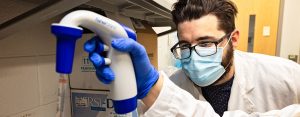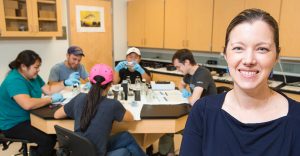The coronavirus (COVID-19) pandemic has significantly impacted the world in many ways. This virus is generally transmitted from person-to-person via airborne droplets produced when an infectious person coughs and/or sneezes [1]. These droplets can enter openings (e.g., mouth, nose, lungs) of nearby susceptible individuals and potentially cause infection. The likelihood of virus-laden droplets being inhaled increases as distance to the source decreases, thus social distancing (6-feet apart) is encouraged. Another measure currently being mandated by many states (including North Carolina) is for individuals to wear face masks when in indoor public places, especially when social distancing is not possible (exception for when eating/drinking). Masks reduce the likelihood that virus-contaminated droplets could become air-borne, hence reducing transmission risk [2]. Disposable personal protective equipment (PPE), such as masks, are commonly used. Due to widespread PPE use by the public and others, it is important to discuss proper waste disposal practices.
A French non-profit organization, Opération Mer Propre, was one of the first to officially sound the alarm that COVID-19 PPE could be a source of plastic pollution. This organization sponsors ocean clean-up activities and divers have begun to discover PPE (e.g., masks, gloves, hand sanitizer bottles) in clean-up operations [3]. The discovery of these types of PPE is likely related to the COVID-19 pandemic and is referred to as “COVID waste” [3]. In nature, it is estimated that plastic masks decompose in 250-500 years (estimate based on decomposition time of disposable diapers that also contain polypropylene fibers, found in some types of disposable masks) [3,4].
In the year leading up to COVID-19, single use plastics were experiencing increased restrictions and many companies were joining the “green” bandwagon, moving towards more sustainable products. Unfortunately for the sustainability movement, oil prices have plummeted in recent years, making “virgin” plastic cheaper than the recycled plastic alternative [5].
Several environmental groups in Hawaii have taken a stand against “COVID waste” and have joined a campaign to increase awareness of PPE showing up on shorelines across the globe [3,6]. This campaign focuses on public education about proper disposal of PPE (i.e., direct disposal of masks and gloves into a garbage bin as recommended by the Centers for Disease Control and Prevention) [6]. The same campaign also advocates using reusable products (e.g., cloth masks that can be washed between uses), where appropriate [6].
Mask wearers should follow proper disposal procedures when using single-use PPE and consider using reusable cloth masks that can be sanitized between uses.
References:
- CDC. 2020. Coronavirus Disease 2019 FAQ. Retrieved From: https://www.cdc.gov/coronavirus/2019-ncov/faq.html#Basics
- CDC. 2020. Coronavirus Disease 2019, Help Slow the Spread of COVID-19. Retrieved From: https://www.cdc.gov/coronavirus/2019-ncov/prevent-getting-sick/cloth-face-cover-guidance.html
- Kassam, A. 2020. More masks than jellyfish: Coronavirus waste ends up in ocean. The Guardian. Retrieved from: https://www.theguardian.com/environment/2020/jun/08/more-masks-than-jellyfish-coronavirus-waste-ends-up-in-ocean
- WWF. 2018. World Wildlife Foundation, The lifecycle of plastics. Retrieved from: https://www.wwf.org.au/news/blogs/the-lifecycle-of-plastics
- Denne, L. 2020. Coronavirus pandemic threatens to undo progress on plastic pollution. NBC News. Retrieved from: https://www.nbcnews.com/science/environment/coronavirus-pandemic-threatens-undo-progress-plastic-pollution-n1207231
- Else, J. 2020. New kind of litter. The Garden Island. Retrieved from: https://www.thegardenisland.com/2020/05/08/hawaii-news/new-kind-of-litter/
Photo Source: The Guardian, courtesy of Opération Mer Propre
*This article is contributed by Heidi Knecht (DrPH EOH Student).




